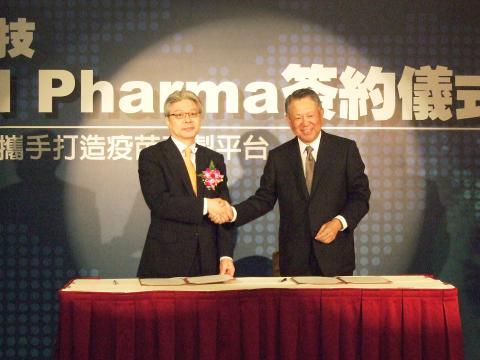Vaccine maker Adimmune Corp (國光生技) yesterday inked a cooperation agreement with UMN Pharma Inc, giving it access to the Japanese firm’s technology, which could help shorten its vaccine manufacturing process to two months from six months.
Under the agreement, Adimmune will also be allowed to file for clinical trial application of UMN Pharma’s flu vaccines and to sell them in China and Taiwan, the Taiwanese firm said.
“We make vaccines by injecting live viruses into fertilized chicken eggs, but in the future we can consign the process to UMN Pharma and take advantage of their technology of baculovirus expression vector system [BEVS],” Adimmune president Liu Chung-cheng (留忠正) said at a press conference.

Photo: Chen Yung-chi, Taipei Times
In the future, Adimmune chairman Steve Chan (詹啟賢) said the company may start part of its vaccine manufacturing process in Japan, but will still use its Taiwanese factory for the final process.
UMN Pharma has the world’s largest BEVS capacity, after the company invested ¥10 billion (US$1.1 billion) to build a factory in Gifu Prefecture, Japan, company chairman and CEO Tatsuyoshi Hirano told the press conference.
UMN Pharma’s new factory started operating in May and can produce 10 million vials of vaccines a year, Hirano said, adding that the factory would continue expanding capacity.
The Japanese firm acquired BEVS technology from US-based drug maker Protein Sciences Corp, which gave UMN Pharma the exclusive rights to use it to manufacture drugs in Asia. The technology helps save costs, because it boosts production of the proteins required to produce vaccines.
Tokyo-listed UMN Pharma has a market value of ¥32.7 billion, with three flu vaccines in its new drug pipeline, according to First Capital Management Inc (第一金投顧).
Yesterday’s deal makes Adimmune the only strategic partner of UMN Pharma on either side of the Taiwan Strait, and will enable it to produce a larger stock of flu vaccines within a short period should an outbreak occur, the company said.
Adimmune reported losses of NT$309.78 million (US$10.5 million), or NT$1.68 per share, during the first half of the year, according to its Taiwan Stock Exchange filing.
First Capital forecast that Addimune’s losses would shrink to NT$1.26 per share next year, after receiving the green light to sell vaccines in China and adjuvant of hepatitis A in Europe.
It further expects the company to post a profit of NT$3.18 per share in 2015, with vaccine sales in China reaching 1.5 million vials.
Adimmune shares rose 6.15 percent yesterday, outperforming the TAIEX, which climbed 0.52 percent.

The US dollar was trading at NT$29.7 at 10am today on the Taipei Foreign Exchange, as the New Taiwan dollar gained NT$1.364 from the previous close last week. The NT dollar continued to rise today, after surging 3.07 percent on Friday. After opening at NT$30.91, the NT dollar gained more than NT$1 in just 15 minutes, briefly passing the NT$30 mark. Before the US Department of the Treasury's semi-annual currency report came out, expectations that the NT dollar would keep rising were already building. The NT dollar on Friday closed at NT$31.064, up by NT$0.953 — a 3.07 percent single-day gain. Today,

‘SHORT TERM’: The local currency would likely remain strong in the near term, driven by anticipated US trade pressure, capital inflows and expectations of a US Fed rate cut The US dollar is expected to fall below NT$30 in the near term, as traders anticipate increased pressure from Washington for Taiwan to allow the New Taiwan dollar to appreciate, Cathay United Bank (國泰世華銀行) chief economist Lin Chi-chao (林啟超) said. Following a sharp drop in the greenback against the NT dollar on Friday, Lin told the Central News Agency that the local currency is likely to remain strong in the short term, driven in part by market psychology surrounding anticipated US policy pressure. On Friday, the US dollar fell NT$0.953, or 3.07 percent, closing at NT$31.064 — its lowest level since Jan.

Hong Kong authorities ramped up sales of the local dollar as the greenback’s slide threatened the foreign-exchange peg. The Hong Kong Monetary Authority (HKMA) sold a record HK$60.5 billion (US$7.8 billion) of the city’s currency, according to an alert sent on its Bloomberg page yesterday in Asia, after it tested the upper end of its trading band. That added to the HK$56.1 billion of sales versus the greenback since Friday. The rapid intervention signals efforts from the city’s authorities to limit the local currency’s moves within its HK$7.75 to HK$7.85 per US dollar trading band. Heavy sales of the local dollar by

The Financial Supervisory Commission (FSC) yesterday met with some of the nation’s largest insurance companies as a skyrocketing New Taiwan dollar piles pressure on their hundreds of billions of dollars in US bond investments. The commission has asked some life insurance firms, among the biggest Asian holders of US debt, to discuss how the rapidly strengthening NT dollar has impacted their operations, people familiar with the matter said. The meeting took place as the NT dollar jumped as much as 5 percent yesterday, its biggest intraday gain in more than three decades. The local currency surged as exporters rushed to